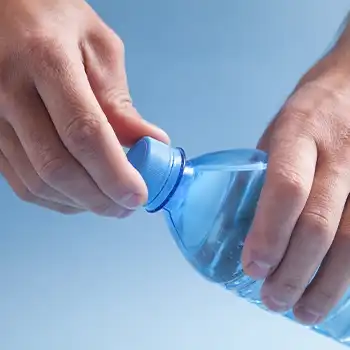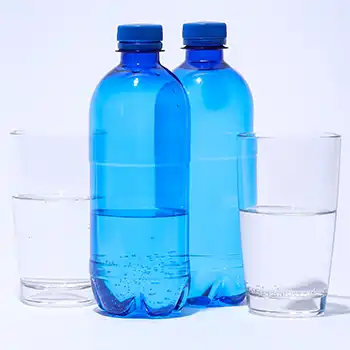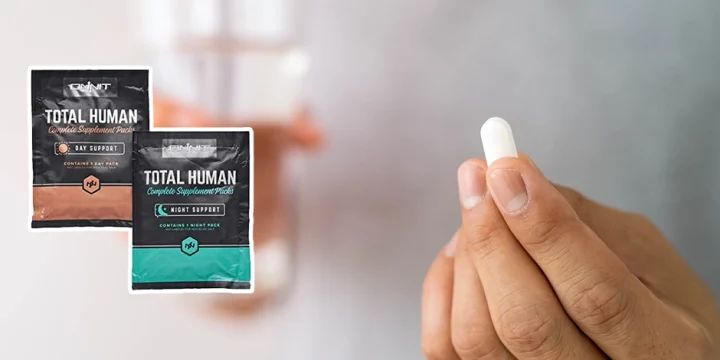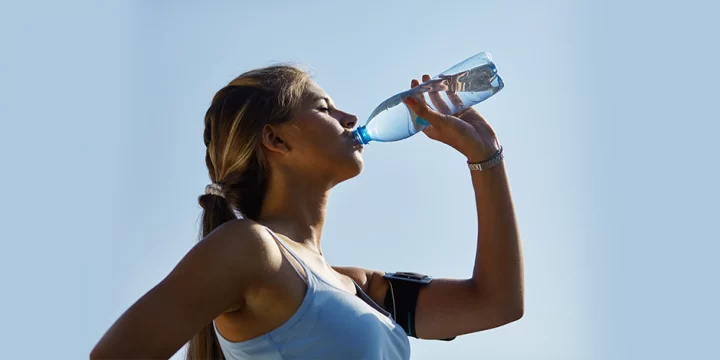One of the first habits I started to track when I begin my weight loss journey is my water consumption.
This habit is not well-established for most but is critical to weight loss and overall health.
Because many people underestimate water’s value, I sat with a doctor and our dietician to further consider the benefits of drinking water, especially when trying to lose weight.
Arming yourself with information is invaluable, so read on to find out about how water helps with weight loss.
Quick Summary
- To lose weight effectively, it's recommended to drink at least eight 8-ounce glasses of water daily.
- Overhydration, or water intoxication, can lead to serious health issues, including swelling of brain cells.
- Approximately 59% of U.S. adults report that increasing water consumption is a key component of their weight loss strategy, according to the study published in PubMed.
- From my experience, staying properly hydrated has been crucial for both weight management and peak physical performance.
How Drinking Water Can Help You Lose Weight

As many as 59% of U.S. adults point to increasing water consumption as a successful part of their weight loss plan, according to the study published in PubMed [1].
In my MMA training, upping my water intake was a game-changer for weight loss.
Research shows that healthy eating habits are linked to individuals who drink more water, consuming approximately 200 fewer calories per day than those who do not drink enough water [2].
Keep in mind that suddenly increasing your water intake takes your body time to adjust, and you may initially gain weight.
Seeing a few pounds more on the scale shouldn’t be alarming; they are likely the result of the increased water and not any long-term weight gain.
“If you’re not a fan of plain water, spruce it up with healthful add-ins, like lemon or lime, fresh mint, sliced cucumber, fresh ginger, or slightly mashed bits of seasonal fruit.”
-Cynthia Sass, MPH, RDN
Before we talk about the health benefits of water, it is important to understand that you can drink too much water.

Drinking Too Much Water

I learned the hard way in the ring that too much water can lead to water intoxication, diluting blood sodium.
According to the Medical News Today, sodium maintains fluid balance in the body’s cells, and too much water drops the sodium levels, bringing excess water into the cells and causing them to swell [3].
The swelling can affect all cells in the body, including those in the brain, increasing pressure inside the skull which can cause severe headaches, nausea, and vomiting [4].
More extreme cases of overhydration can lead to [5]:
- Drowsiness
- Muscle cramps or weakness
- Raised blood pressure6
- Vision issues, like double vision
- Cognitive issues like confusion
- Difficulty breathing
Now we have that covered, let’s look closer at how water helps you lose weight.
May Boost Metabolism
Drinking cold water and hot water may help you lose weight by temporarily boosting your metabolism.
Drinking cold water might have a subtle effect on boosting metabolism, as your body expends energy to heat the water to body temperature, potentially aiding in weight loss efforts.
One study published in Journal of Clinical & Diagnostic Research suggests that drinking water can boost metabolism by as much as 30% for approximately an hour after consumption [6].
Metabolism is how the body converts what you eat and drink into energy, even while at rest, for essential functions like breathing, circulating blood, and regulating hormone levels [7].
Higher metabolism equates to burning more calories, even while at rest, promoting weight loss by contributing to a calorie deficit.
May Increase Calories Burned

Many believe the body burns a few more calories by bringing cold water up to body temperature through thermogenesis. Increased thermogenesis leads to weight loss through elevated metabolism rate [8].
As we have established in the previous section, increased metabolism burns more calories, even while the body is at rest.
May Suppress Appetite
Maintaining proper hydration can go a long way in supporting weight loss efforts as water is considered a natural appetite suppressant, according to the Journal of Natural Science, Biology and Medicine [9].
Water can take up space in the stomach, promoting a sense of fullness.
People may think they are hungry when they may be thirsty; reaching for a glass of water instead can lead to reduced snacking, promoting weight loss.
Related Article: What Are The Best Appetite Suppressant Pills?
Can Reduce Calorie Intake

Many people believe that drinking water before consuming a meal reduces how many calories you eat.
There is some truth to this claim, especially in middle-aged versus younger individuals. [10].
One 12-week study published in PubMed found that participants that drank 16.9 ounces of water before a meal lost 44% more weight than those who did not consume water before eating [11].
Drinking a glass of water before meals can help you feel full, leading to eating less and aiding in maintaining a calorie deficit for weight loss.
Also, swapping sugary drinks with water cuts down calorie intake, as water is a zero-calorie alternative.
“Water can help you lose weight and keep it off. It temporarily increases your metabolism and helps fill you up before meals.”
-Helen West, Registered Dietitian
May Increase Energy Levels
One of the key components of weight loss is working out. Maintaining good hydration is crucial not just for health, but also for enhancing the effectiveness of your workouts. Proper hydration can help reduce fatigue and improve muscle function, potentially leading to a more efficient calorie burn during exercise.
Exercise increases energy expenditure which will promote a calorie deficit.
Staying hydrated reduces the risk of things that hinder or eliminate the ability to work out, like increased fatigue, decreased motivation, muscle cramps, and inability to regulate body temperature [12].
The bottom line is both water and exercise increase energy giving you a win-win for weight loss.
How Much Water Should You Drink for Weight Loss?

The amount of water needed for weight loss depends on individual factors like weight and activity level. For me, the right amount of water depends on my training intensity and weight goals.
While the old guideline suggested eight 8-ounce glasses daily, it's now understood that hydration needs vary based on age, size, weight, activity level, and climate.
A general guideline is to drink half an ounce to an ounce of water per pound of body weight each day [13].
Once you are eating healthy, working out regularly, and drinking the appropriate amount of water, if you still find the pace of your progress too slow, I would advise you to go ahead and add fat burners to your diet.
A higher activity level like exercising a lot, a physically demanding job, or living in a warmer climate would bring the need to the upper part of that range to avoid dehydration.
Other Benefits of Drinking It Every Day

Water is essential whether you are losing weight or just living and breathing. Daily hydration keeps my mind sharp, crucial for strategic thinking in the ring.
Staying hydrated can positively influence your mental state and decision-making abilities. Even mild dehydration can lead to fatigue and confusion, which might impact your motivation for engaging in healthy lifestyle choices such as regular exercise and nutritious eating.
Let’s briefly look at a few other health benefits of adequate hydration.
May Prevent Kidney Stones
Studies published in Cochrane Library suggest that increased water intake may decrease the chance of recurring kidney stones in individuals that have already had them and may even reduce the risk of the onset of new ones in people who have never had them [14].
Drinking more water naturally increases urination, helping the kidneys flush out minerals that could form stones.
This process not only reduces the chance of new stone formation but also helps in expelling any smaller existing stones.
Maintain Healthy Digestion
Staying adequately hydrated and drinking water during and after meals can help the body break down food and absorb nutrients.
Water and a diet full of healthy food (fruits and veggies) can also prevent other digestive issues like constipation [15].
Flush Toxins
Your kidneys work hard to clean your body and remove toxins. In order for the kidneys to do that properly, you must consume an adequate amount of water [16].
One of the best ways to tell if you are drinking enough water is by the color of your urine; light yellow with no odor can be a sign of optimal hydration.
You should also keep in mind that chronic dehydration can lead to kidney issues and other serious health conditions [17].
FAQs
When Is The Best Time To Drink Water To Lose Weight?
The best time to drink water to lose weight is just before a meal because it increases your feeling of fullness, resulting in less caloric intake. A 2018 Clinical Nutrition Research study found that consuming water pre-meal is an effective weight loss strategy [18].
Does Warm Water Burn Fat?
Drinking warm water may burn fat by boosting metabolism. Research continues, but one study published by The Journal of Clinical Endocrinology and Metabolism supports this theory [19].
References:
- https://pubmed.ncbi.nlm.nih.gov/23803882
- https://pubmed.ncbi.nlm.nih.gov/16421349/
- https://www.medicalnewstoday.com/articles/318619
- https://www.sciencedaily.com/releases/2018/05/180522114623.htm
- https://www.healthline.com/health/overhydration
- https://www.ncbi.nlm.nih.gov/pmc/articles/PMC3809630/
- https://www.mayoclinic.org/healthy-lifestyle/weight-loss/in-depth/metabolism/art-20046508
- https://www.sciencedirect.com/topics/agricultural-and-biological-sciences/thermogenesis
- https://www.ncbi.nlm.nih.gov/pmc/articles/PMC4121911/
- https://pubmed.ncbi.nlm.nih.gov/17228036/
- https://pubmed.ncbi.nlm.nih.gov/19661958/
- https://academic.oup.com/nutritionreviews/article/68/8/439/1841926
- https://www.webmd.com/diet/drink-more-water-tips
- https://www.ncbi.nlm.nih.gov/pmc/articles/PMC7012319/
- https://www.webmd.com/digestive-disorders/water-a-fluid-way-to-manage-constipation
- https://www.medicalnewstoday.com/articles/325391
- https://www.healthline.com/health/chronic-dehydration
- https://www.ncbi.nlm.nih.gov/pmc/articles/PMC6209729/
- https://pubmed.ncbi.nlm.nih.gov/14671205/
About The Author
You May Also Like






